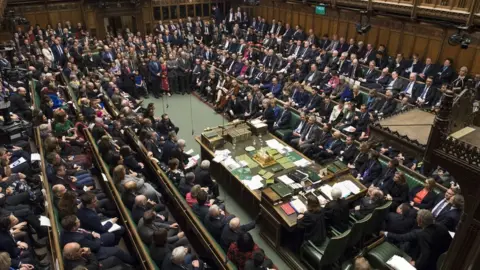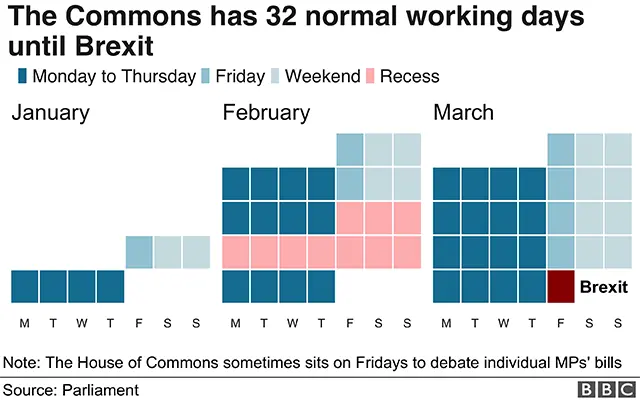Brexit: MPs facing longer hours to help break deadlock
 UK Parliament/Mark Duffy
UK Parliament/Mark DuffyMPs may need to work longer and lose their February half-term break if Brexit is to be delivered on time.
The government is to consult Parliament on what extra hours will be needed to get its legislation onto the statute book before the planned 29 March exit.
Theresa May will seek backing for her deal in another Commons vote on Tuesday.
Commons leader Andrea Leadsom described bids by MPs to prevent a no deal as a "thinly veiled attempt to stop Brexit".
Writing in the Sunday Times, she said this would be an act of "constitutional self harm".
The UK is due to leave the EU at 23:00 GMT on 29 March, and the prime minister has faced repeated calls to rule out the prospect of leaving without a deal if no agreement can be reached.
Ms Leadsom had earlier expressed "grave concerns" about a bill, proposed by Labour MP Yvette Cooper, which could extend Article 50 - which triggers the UK's withdrawal from the EU - by nine months, unless the prime minister can secure a deal by the end of February.
But Ms Cooper said her proposals were an attempt to avoid a no deal scenario rather than block Brexit, stressing that her bill would give parliament the power to decide the length of the delay - which could be less than nine months.
She told BBC One's Andrew Marr Show she hoped it would put pressure on the prime minister to secure a deal before the end of February.
"I'm trying to get the government to take some responsibility," she said.
She also called on Labour leader Jeremy Corbyn to back her bill, adding "we can't keep waiting for other people to sort this out".
Shadow Education Secretary Angela Raynor told Sky News that Labour would do "whatever it takes to avoid a no-deal Brexit".
"If that means backing an amendment then we will do that," she added.

In the Observer, her cabinet colleague David Lidington said he understands why MPs are worried by the prospect of no deal - but urged them to look at Mrs May's revised plan before deciding whether Brexit should be delayed.
Mr Lidington, who last week held discussions with opposition MPs, said: "We must keep our focus on the only real way to rule out no deal - and that is to find common ground on a deal".
On 15 January, the withdrawal deal Mrs May negotiated with the EU last November was rejected by MPs by a historic margin - 432 votes to 202.
BBC political correspondent Iain Watson said the government's demand to extend the parliamentary day was a way of Mrs May sending a signal to MPs that she intends to stick to the planned March departure.
The House of Commons recess between 14 and 25 February could be cancelled, and MPs would be asked to start earlier and finish later on days they sit.

MP working hours
The normal sitting hours for the House of Commons are:
Monday: 14:30 - 22:30
Tuesday: 11:30 - 19:30
Wednesday: 11:30 - 19:30
Thursday: 09:30 - 17:30
Friday (if sitting): 09:30 - 15:00
However MPs also work outside of these times dealing with concerns of constituents.
The Commons generally only sits on 13 Fridays a year to consider private members' bills, which are put forward by MPs who are not government ministers.
The Commons sat for 142 days in the 2016-17 session.
Source: Parliament website

Opposition and backbench MPs have been tabling amendments to the PM's motion in a bid to force the government to change direction.
It will be up to Speaker John Bercow to select amendments to Mrs May's plans to put to a vote.
Among them are the amendment from Conservative MP Dominic Grieve, who will ask the government to consider a range of options over six full days in Parliament before the March deadline, while the Lib Dems will be calling for a "People's Vote" - another referendum.
Conservative MP Andrew Murrison's amendments aim to win round moderate opponents of the backstop arrangement. by making it time-limited.
The backstop plan - a fallback position to avoid the return of customs checks at the Irish border if the UK fails to agree a deal with the EU - is a major sticking point for opponents of Mrs May's withdrawal agreement.
Critics claim the arrangement would separate Northern Ireland from the rest of the UK by keeping it more closely aligned to EU rules.
